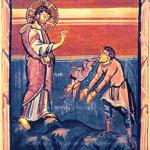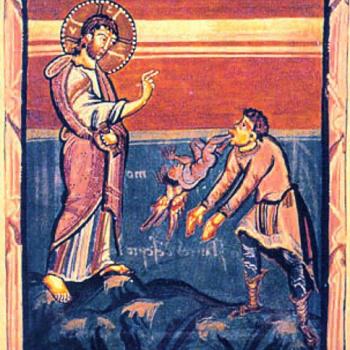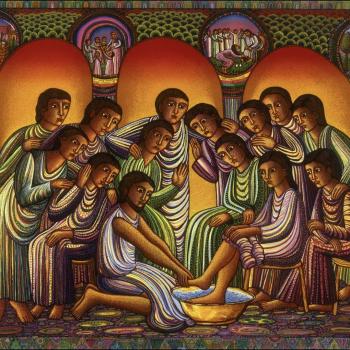My friend, Dr. Dru Johnson, has written an intriguing new book called What Hath Darwin to Do With Scripture? It is an interdisciplinary study bringing the Bible and evolutionary theory into conversation, highlighting clear differences, but also noticing that they are sometimes addressing the same questions. Johnson was kind enough to share a bit about the book, check it out!
Darwin and the Bible: Conflicting Perspectives, But Great Conversation Partners
by Dr. Dru Johnson
I read the required amount of Darwin in college, but I now realize that I didn’t appreciate his insights. I wasn’t a Christian then, so I couldn’t see the biblical parallels to “natural selection.” Now, when I mull over Darwin’s elegant proposals for “natural selection” as a biblical scholar, I cannot help but notice the striking similarities it bears to a discussion of scarcity, fit, and propagation coursing through the veins of Scripture. I also cannot help but notice that not many scholars (if any) have talked about these similarities. How can this be? The biblical authors and Darwin appear to uniquely intertwine the topics of scarcity and violence, environmental fit, and sexual propagation.
What Hath Darwin to Do with Scripture? is a disruptive book on the similarities, but also more profound conflicts, between the intellectual world of the biblical authors and the evolutionary sciences. I don’t know why only the Hebrew biblical authors and Darwin seem to be talking about natural selection in this specific framework. Maybe it’s a coincidence. I don’t think so. I think they both are calling attention to what they are seeing in the world, but from very different perches.
Even if their parallels are a grand coincidence, the overlapping concern with selection in Scripture and Darwin’s thinking deserves some attention. In fact, some of their shared thinking persists to some extent into today’s evolutionary sciences. The correspondence also underscores the contrast between these two stories. Specifically, their views both supply stories about the beginning, middle, and future of the cosmos.
These biblical and scientific folktales mean to speak realistically about our beginnings. Both stories believe that they are saying something true about the natural history of the universe (even if we think the biblical authors do it poetically or analogically). Hence, I use the terms “folktale” and “mythology” as a positive, not pejorative, term not related to their truth or historical value. These origin stories productively frame history in light of those events and causal connections that explain current affairs. As the philosopher Mary Midgley says of evolutionary creation stories, they “cannot help being, also a powerful folk-tale about human origins.”[1] They both cannot help but to be good-enough stories about creation trying to explain what we see and how it came to be.
The biblical authors constructed polished and concise stories of human origins in order to reason with us about the invisible organizing features of our cosmos. Because the biblical literature consistently develops these metaphysical views about the invisible forces organizing creation, we will do well to trace their assumptions and teaching from beginning to end. The metaphysics that the biblical authors want us to understand is not a complex abstract system, but a version of our material world reimagined with a different orientation.
They are not just telling stories; they are selling an intellectual tradition rooted in creation, whether you read them as history or mystery. We see the same with the “folk-tales” in the evolutionary sciences.
Following the biblical authors’ leads, What Hath Darwin to Do with Scripture? starts by noticing that biblical literature seems to have an as-it-once-was, no-longer-is, but yet-ever-more-shall-be story about our universe. To say it another way, everything about our world was once well-oriented, then disoriented, and still yet to be re-oriented.
The end game for some of these folktales from the evolutionary sciences will differ on precisely this front: there is no end game. Or, it’s entirely indiscernible to us. For many, there simply is no particular way in which the material universe is supposed to be oriented. For many versions of the story in the evolutionary sciences, the cosmos now is as it always has been and ever more shall be. Not so for the biblical authors, from the Hebrew Scriptures (Old Testament) to the New Testament. Understanding that pivotal reorientation of the cosmos (what I’m calling the “metaphysical” aspect) illuminates how the biblical authors singularly frame the intersection of scarcity, fit, and sex in the process of genetic selection.
Overlaying the maps of these two intellectual worlds—the Bible’s and evolutionary science’s—will show us the various routes they each forge to conceptualize the world we know today. Most interesting for Christians, the relevance of biblical discussions to natural selection and modern evolutionary science is striking. The biblical authors’ persistent dealings with communitarian ethics, proto-scientific paths to knowledge, metaphysical principles, and causal physical relationships makes the biblical intellectual world remarkably relevant for us today. Even more, they are relevant for us in ways that other ancient intellectual worlds would not be.
I argue in What Hath Darwin to Do with Scripture? that the intellectual world of the biblical authors makes our world existentially, ethically, and physically coherent in a way that could be harmonized with many of the findings of science—depending on how one construes both enterprises.
[1] “The theory of evolution . . . is, and cannot help being, also a powerful folk-tale about human origins.” Mary Midgley, Evolution as a Religion: Strange Hopes and Strange Fears, revised ed. (New York: Routledge, 2002), 1.













